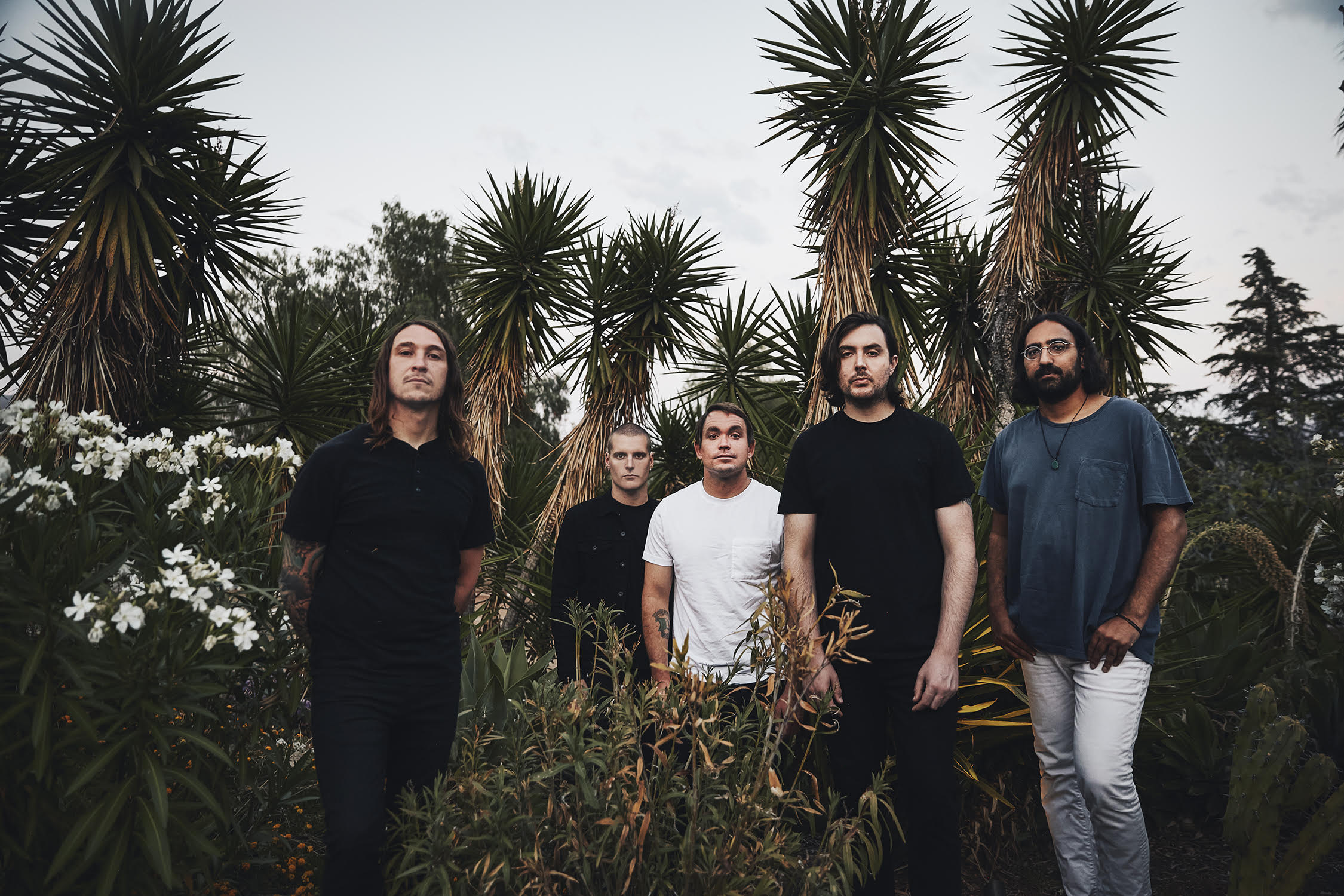Deafheaven vocalist George Clarke was able to live a pandemic dream: He managed to get out of the States safely. His partner, a musician from New Zealand, was able to work and play shows over there; after completing Deafheaven’s latest record, Infinite Granite, Clarke was able to get a visa and spent January through late April of this year in the country. Though it took him a couple days to avoid sidestepping people as he often had to in Deafheaven’s home base of Los Angeles, he felt immensely grateful to see music (especially at a time when summer shows in the States seemed dicey) and be amongst people again. It did, however, feel like an alternate reality to some degree.
“My experience was great, but it was interesting how, even though it was all over the news and people were very aware of it, they were, in a greater way, divorced from the entire situation,” he told SPIN over the phone. “There wasn’t a sense of worry, or even a real sense of acknowledgment. It was like experiencing 75% of something, because although there was all this freedom, I wasn’t living my life. My work and my passion were all still very suspended in the States.”
Granite, based on its singles “Great Mass of Color,” “In Blur,” and “The Gnashing,” had some fans feeling like they had slipped into a parallel universe. Clarke has largely shifted to sonorous clean vocals, not the black metal rasp he almost exclusively wielded in the past. Drummer Dan Tracy still gets a workout, but you don’t hear a lot of blast beats. Outright metal fury was seemingly abandoned in favor of sky-scraping rock surges, feeling more single-focused than ever. Is the Deafheaven we knew gone for good? Was the mask coming off?

Also Read
The 30 Best Songs of 2021
No — their essence still shines, just with different emphasis. “Blur” is just as urgent as “Black Brick” or New Bermuda’s “Luna,” driven by clean guitars that could only come from such an Anglophilic guitarist like Kerry McCoy. His and Shiv Mehra’s dual jangle really came to the fore on their last album, Ordinary Corrupt Human Love, and their pop instincts guide them right on tracks like “Color” and “Villain.” Meanwhile, “Lament for Wasps” is their peak of pure gorgeousness, layered more from vocal harmonies than guitars. Granite still has Deafheaven’s multifaceted appeal — one that still isn’t always easy to digest. They’ve never been the one thing you define them as. They’re Deafheaven.
Read our conversation with Clarke below.
SPIN: A lot of people who have heard the new singles think the new material is a complete 180, even though it was hinted at with the last record. Do you feel like it’s a complete shift?
George Clarke: I think it’s just us turned inside out a bit. We’re flipping our sound in different ways, but it still is very much our sound. We all knew the vocal was going to be the thing that maybe threw people.
It’s interesting that you guys have been a band for a little over a decade. Y’all are still seen as insurgents, these new kids just fucking shit up.
We do seem to be a rod for conversation. It’s something I’m aware of every album. I think people, perhaps because of the slight stylistic detours, will reference people’s reactions to this record as they did [with] reactions to Sunbather, but really it’s all our albums. The same thing happened with New Bermuda. I remember tons of people talking about the back end of “Brought to the Water” and [were] mad about it. And the same thing with Ordinary — lots of people were commenting about how they didn’t like “Honeycomb.” I honestly don’t like to [read reviews/commentary] too much, but what I see is people saying, “Why doesn’t this sound like Ordinary? Why doesn’t it sound like New Bermuda?” And it’s funny — it continues! I think that’s fine. If we make something that moves people to that degree, I think it’s cool in a way. For it to still be happening all this time, yeah, it’s unique, I suppose.
The response is interesting to me. My perception of our music and how other people hear it is so different. It’s like what you were saying: People are calling this a 180, and I don’t know. When we put out “The Gnashing,” I was thinking the whole time people are gonna talk about this doomy end, because we never do anything like that, and this Slayer solo that’s totally verbed out. When it came out, it was widely called a shoegaze song. To me, it doesn’t sound like that at all, and I was even kinda nervous at the end with me and [bassist] Chris [Johnson] calling it an Alice in Chains bite. My head was in a totally different place. It’s always interesting to see the conversations, to see how people interpret this music.
Something about the response to the new songs that’s rubbed me the wrong way is that since it’s “less metal,” it’s better, which is a weird notion.
I’m with you. I’ll say this: If your headspace is the quality of this depends on the level of metal material, you may not like it. I would advise approaching it differently. A lot of people have responded very positively, and I feel very grateful to have made this record. I think it’s OK in a genuine way if someone gives this album a chance who is a fan of ours and is [like], “This isn’t for me.” I think the “more metal/less metal” view is not the best way to approach the record.
I feel like longtime Deafheaven fans will have a deeper connection with “Lament for Wasps.” What’s behind it?
It’s one of my favorite songs on the record. It’s the big centerpiece. We had talked about it being a single, and there was a lot of pull for it, but ultimately we felt like this is gonna be a nice egg right in the middle of the record that has a lot of different flavors and turnarounds. It’s the first song that we wrote [for the record]. To me, it sounds the most like a song that would be off Ordinary Corrupt. It has this sort of Stone Roses, Oasis vibe for the beginning, and it turns into more of a “Deafheaven” song. We change into our own gear halfway through. It’s Kerry’s favorite song on the record, I believe. That’s one of the choruses that he and I wrote together. He was really instrumental in pulling that track together.
The vocal harmony towards the end is killer.
Shiv, Chris and I — and Dan too, I think — were backstage somewhere, and Shiv was playing those chords, and we all came up with that melody. Chris really fills out the back half of that with those big vocals, his vocals on this record are very, very good. He knocked it out.
“Mombasa,” the closing track, does bring a return to some of the black metal sound and blast beats and your screeches, even if people thought y’all had abandoned metal. Was that a treat for the fans of your heavier side?
There really wasn’t a whole lot, other than it just felt good. That’s just where the song felt like it was gonna go. The blast beat is so funny because it was such a conversation throughout. And we tried it in a couple different songs because there were moments along writing the record where we like, “Well, it could fit here; let’s give it a shot,” “Lament for Wasps” being one of them. Then we would just be like “This is not right; it doesn’t feel impactful enough to be here.” When we were writing ”Mombasa,” that felt different. It felt very powerful. Kerry and Shiv had come up with that melodic interplay that they do in the middle of the blast section that I just immediately loved. When we’re jamming, that is what it amounts to: Does it feel good to have, and is it here for a reason?
In the way that it ends, we had this idea during sequencing — “Shellstar,” the way the record starts, is so small and kind of slowly lets you in, and it’s really not until the end of “Shellstar” that the record fully starts coming in. That song has big choruses, but it’s really towards the end and onward [that] the album propels, and I think it propels in this upward fashion, and I like that “Mombasa” ends at its biggest point. It’s this 54-minute crescendo, in a way.
People throw out Slowdive as a lazy reference because of the shoegaze parts of your sound, BUT would you say that “Great Mass of Color” is your “Alison?”
It might be. It might end up being the biggest song of our shoegaze character. In that respect, it would be quite an honor to be compared to “Alison.” It’s sort of like asking “Is this your ‘Master of Puppets?’”, which is what we usually get.
Both of those songs have a very drunk-in-love energy.
For me, it has that dreamy quality. There is a sort of lackadaisical honesty in it. It’s quite a soul-baring song in a way we don’t typically get that far into.
You take a more direct approach with lyric-writing for this record. What was your headspace like as far as that goes?
I think in a way they have an abstract quality still, but I did want them to be presented in a clearer fashion. My lyric style, especially because I can use the lack of clarity as a crutch, can be sometimes convoluted. Having all that effect stripped away and having this more naked approach — they had to be more considered, and they also had to work within melody. I’ve never written vocal melodies before, and it was definitely interesting and a long process. Every song on there [has] tons of versions and tons and tons and tons of demos. It was a lot of failing and trying to make it work. What we ended up with was kind of the best versions of ‘em.
Do you hope this record will break the stupor of COVID and get people to love life again, or at least not hate it as much?
I think that this album, thematically, has a lot of weight and kind of, for a lack of a better word, darkness surrounding it, because a lot of it was worked on during the year we all had. But there is a hope that the music can reshape those themes and people find that the words are reshaped by what Kerry and Shiv and Chris and Dan are doing. It would be nice to have a little relief through music. If people can connect with this album in that way, that will be very special, because I know that in its own way, the music frees the lyrics from themselves.




